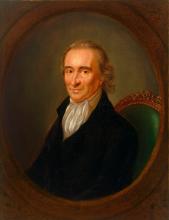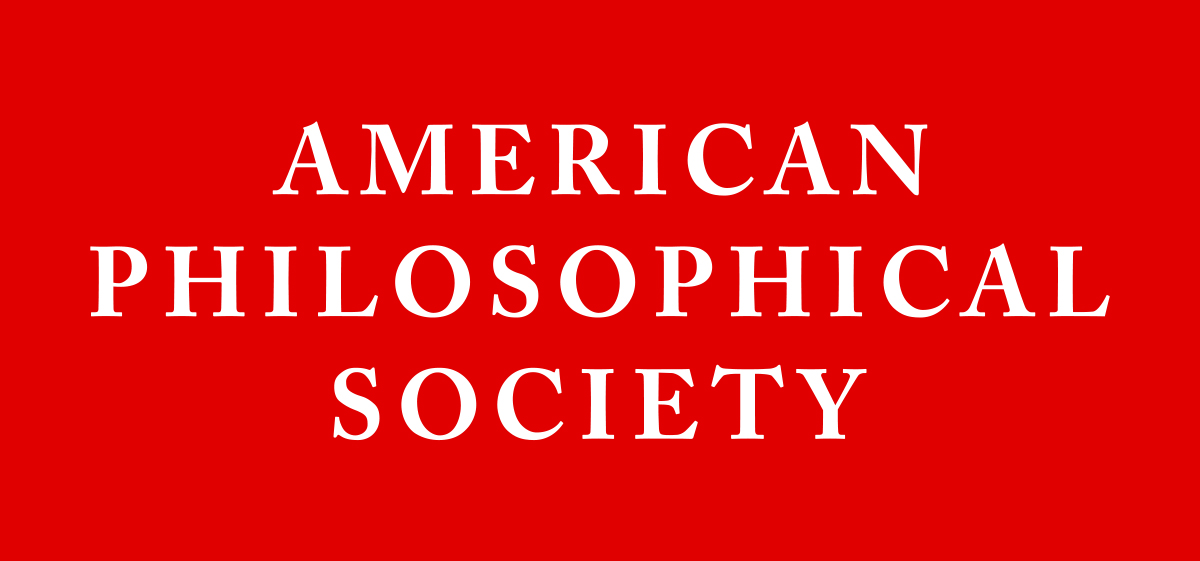Thomas Paine (438)
Election date: 1785 
Thomas Paine (29 January 1737–8 June 1809) was an author, revolutionary, and a member of the American Philosophical Society, elected in 1785. Born in Thetford, England, to a Quaker corset-maker and an Anglican daughter of the town clerk, Paine’s had a tug-of-war between the two faiths: likely baptized and confirmed into the Anglican church, Paine’s father disallowed his son learning Latin at his grammar school. After a brief stint as a privateer, he began to work in London as a corset-maker, and eventually opened up a corset shop of his own. Paine married (1759), moved following financial difficulties, and after his wife’s death during childbirth (1760), quit corsetry altogether to enter the field of his late wife’s father: excise taxes. After some training, he began working as an excise officer in 1762, only to be dismissed in 1765 for neglecting to examine the items he excised. Paine had no option but to resume corset-making, and also picked up a career in teaching. He resumed his excise career in Lewes in 1768, and settling into his new home, joined the local debating club and quickly earned a reputation as an extremely strong orator. This led Paine to finally find his calling in 1772, writing a pamphlet advocating for higher salaries for excise officers. His success, however, did not signal the end of his bad luck: in 1774 his negligence once again earned him dismissal from his excise post, and subsequently his wife left him, and his possessions were repossessed and auctioned off.
Now at rock bottom, Paine’s fate quickly turned upon meeting Benjamin Franklin in London. Having been familiar in London scientific circles back when he lived in the city, he acquired a letter of introduction from Franklin and thereby set sail for Philadelphia. Carried off his ship on a stretcher due to seasickness and fever, Paine landed in Philadelphia in the fall of 1774. After recovering, he dove right into work as the editor of the Philadelphia Magazine, where resumed his romance with political writing. With a quickly growing reputation, he became close with Benjamin Rush and joined the intellectual and activist circles of his newfound home. By 1775, inspired by his new friends, Paine embarked on the task of writing a pamphlet advocating for American Independence.
Thus Common Sense (1776) was born—the most popular, persuasive, and influential piece of political writing of its day. A few days after the publication of the Declaration of Independence, Paine joined a militia and became secretary to General Daniel Roberdeau, defending Perth Amboy, New Jersey and becoming aide-de-camp to General Nathaniel Greene. Shortly after, he began publishing his The American Crisis essays (1777-1783), which boosted morale when British defeat seemed all but impossible. His work landed him some administrative offices, including secretary to the Committee on Foreign Affairs of Congress, however he was not there long before he leaked information confidential to that office in his diatribe against Silas Deane, and had to resign the post. Nevertheless, Paine’s career remained ultimately unscathed, as he accompanied Colonel John Laurens on a diplomatic mission to France (1781).
Returning penniless, he utilized his proven writing ability to earn himself a livelihood. Per the request of Robert Morris and Congress, he began writing in support of a strong federal government and called for a “continental convention” to establish a strong, federal constitution. Paine thereby earned himself a considerable fortune—as well as a seized tory estate—as he continued advocating in print for federalist causes, higher taxes, and a centralized national bank. His efforts, though greatly benefiting himself personally, simultaneously funded the war effort and ultimately led to the establishment of the Bank of North America. Upon the onset of peace, Paine enjoyed undertaking scientific experiments, sometimes alongside figures such as Washington and Franklin. Then, from 1786 until 1790, he shifted gears entirely to dedicate most of his time to the construction of his design for a wrought-iron bridge. Unable to secure funding in America, where he still felt underappreciated, he sought support in Europe. Londoners completed a version of his bridge in 1790, but the structure began to yield to the weather within months.
However, Paine had little time to lament, as he found himself embroiled once again in political writing. This time, he took up the Tricolour flag of the French Revolution, publishing Rights of Man in 1991, and the second part the following year. In both he praised American republicanism and advocated for a free-market society with a necessary substantial welfare system to alleviate poverty. His work inspired a political uprising among the lower classes, and the repressive response from the British government led Paine to flee to Paris, where the French, fresh with revolutionary zeal, received him with open arms and a seat in the National Convention (1792). He voted to abolish the French monarchy months before Britain declared him an outlaw, barring him from entering the nation of his birth. Paine’s safety in Paris was under similar pressure as well, as his stance against execution of King Louis XVI led to his imprisonment upon the ascension of the Jacobins. During his sentence, Paine wrote The Age of Reason (1794), a scathing critique of Christianity.
Embittered by the fact that the United States failed to secure his release until 1796, George Washington, apparently to blame for Paine’s extended prison stay, became the next victim on his literary chopping block. After two diatribes about the American war hero, Paine’s iconoclasm-streak had no sign of ending: in his pamphlet Agrarian Justice (1797), Paine then came for the concept of private land ownership. Finally, in 1802, Thomas Jefferson, now president, invited Paine back to the United States. However, his deism clashed with the evangelical Christianity taking hold in the fledgling nation, and he thereby retired to his farm and died in obscurity, failing to receive the recognition he thought he deserved until long after his passing. (ANB, DNB)
The holdings below are the touchstone editions of Paine's qualifying works—APS First Editions.
Thanks to the massive Gimbel collection, the Society holds these and many more reprints of Paine's influential works. Unlike most every other entry in this Bibliography, the below does not chronicle every translated and reprinted variation of editions—owing to the innumerable reprints created in the some 250 years since he first penned The Crisis and Common Sense—many of those, however, are available to researchers via the APS Catalog.
Publication: Philadelphia: Printed and sold by R. Aitken, bookseller, in Market-Street, three doors above the Coffee-House, [1781]
Subjects:Iroquois Indians -- Land tenure. | Indian land transfers -- West Virginia. | Land grants -- West Virginia.
Publication: [S.l.], [1792]
Publication: Paris: Printed by Barrois, 1794.
Subjects:Rationalism.
Publication: London: Printed for H.D. Symonds, 1795.
Subjects:Rationalism.
Publication: Edinburgh: Leslie, 1797.
Subjects:Economics. | Pensions.
Publication: [Printed at Lewes], [1772]
Subjects:Tax collection. | Corrupt practices. | Great Britain. | Excise tax. | Great Britain. | Internal revenue. | Great Britain.
Publication: Philadelphia: Printed and sold. by R. Bell, 1776.
Subjects:Political science -- Early works to 1800. | Monarchy -- Early works to 1800. | United States -- Politics and government -- 1775-1783 -- Anecdotes, facetiae, satire, etc.
Publication: Philadelphia printed: And sold by W. and T. Bradford, [1776]
Subjects:Political science -- Early works to 1800. | Monarchy -- Early works to 1800. | United States -- Politics and government -- 1775-1783 -- Anecdotes, facetiae, satire, etc.
Publication: City of Washington: Printed by Samuel Harrison Smith, 1801.
Subjects:Political science -- Early works to 1800.
Publication: [Philadelphia : Styner and Cist], [1776]
Subjects:Monarchy -- Early works to 1800.
Publication: Albany: Printed & sold, by Charles R. & George Webster, 1792.
Subjects:United States -- Politics and government -- 1775-1783 -- Anecdotes, facetiae, satire, etc.
Publication: Paris: Printed by Hartley, Adlard and Son, London: reprinted for D.I. Eaton, 1796.
Subjects:Debts, Public. | Great Britain.
Publication: [Philadelphia]: R. Bell, 1776.
Publication: [London]: Printed and sold by Thomas Clio Rickman, [1798]
Subjects:God. | Natural theology.
Publication: London: Printed and sold by Daniel Isaac Eaton, 1795.
Subjects:Political science.
Publication: Philadelphia: Printed by Charles Cist ... : and sold by Messrs. Hall & Sellers, Robert Aitken and William Prichard, 1786.
Subjects:Political science. | Early works to 1800. | Paper money. | Early works to 1800.
Publication: New York: Printed for the author, [1807]
Publication: Philadelphia, Printed : Boston: Re-printed by Benjamin Edes & Sons, 1782.
Publication: Dublin: Printed for G. Burnet [etc.], 1792.
Publication: London: London Corresponding Society, 1792.
Publication: London: Sold by C. Stalker, and by all booksellers, 1792.
Publication: Philadelphia: Printed by Benj. Franklin Bache, 1796.
Subjects:Citizenship. | United States.
Publication: London: Printed for J. Parsons, 1792.
Publication: Dublin: Printed by James Moore, 1792.
Publication: Philadelphia printed: Dublin reprinted: for W. Wilson, 1783.
Publication: Newburgh [NY]: Printed by D. Denniston, [1797]
Publication: Paris: Printed at the Printing-Office of the Social-Circle: 1797, New York: Reprinted at the Argus-Office, 1798.
Publication: London: Printed and sold by all booksellers, 1797.
Publication: New York: [s.n.], 1802.
Publication: New York: Printed and sold by Elliot and Crissy, 1810.
Subjects:Freemasonry. | History. | Mysteries, Religious.
Publication: Besancon: De l'Imprimerie de Métoyer, 1792.
Publication: London: Printed for J. Debrett, 1787.
Publication: Philadelphia: Printed by John Dunlap, 1780.
Subjects:Debts, Public. | United States. | Public lands. | Virginia. | Early works to 1800. | Public lands. | United States.
Publication: Dublin: Printed by Graisberry and Campbell, 1793.
Publication: London: W. Clark, 1820.
Publication: London: R. Carlile, 1818.
Publication: Baltimore: Printed by David Graham, 1791.
Subjects:Political science.
Publication: London: Printed for J.S. Jordan, 1791.
Subjects:Political science.
Publication: London: Printed: 1792 : Boston: Printed by Thomas and John Fleet, 1792.
Subjects:Political science.
Publication: [Paris: De L'Imprimerie Nationale], [1798]
Publication: Philadelphia: Printed by W. Duane, 1805.
Publication: Philadelphia: Printed at the Temple of Reason Press, 1804.
Publication: Philadelphia printed and London reprinted: for J. Stockdale, 1783.
Publication: London: Printed for J. Ridgway, 1792.
